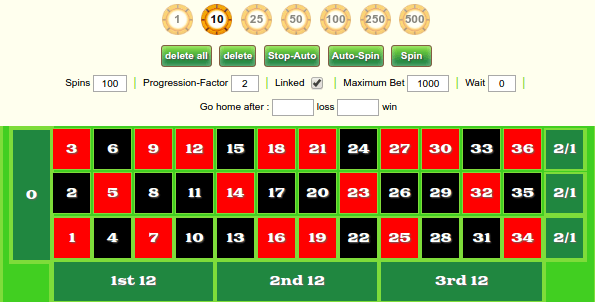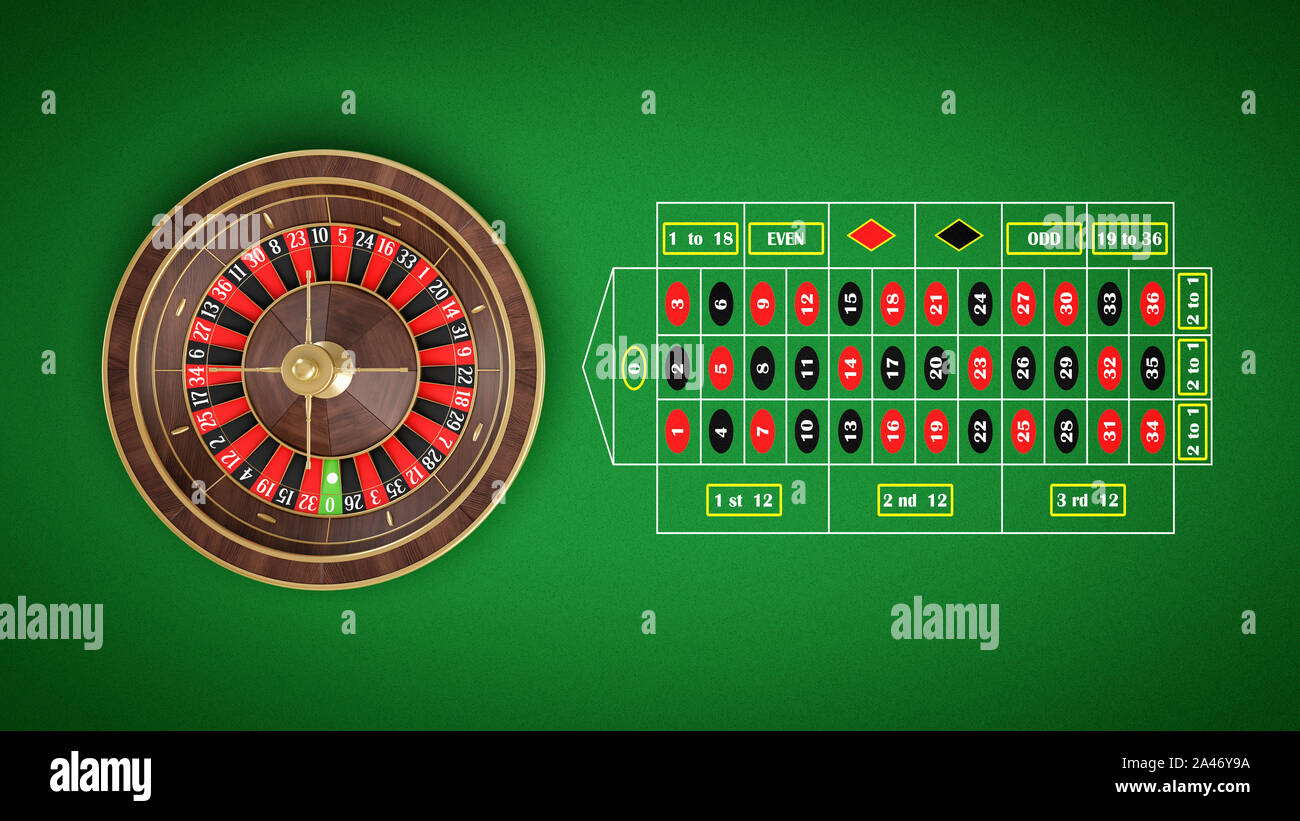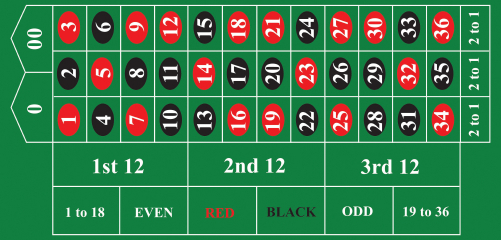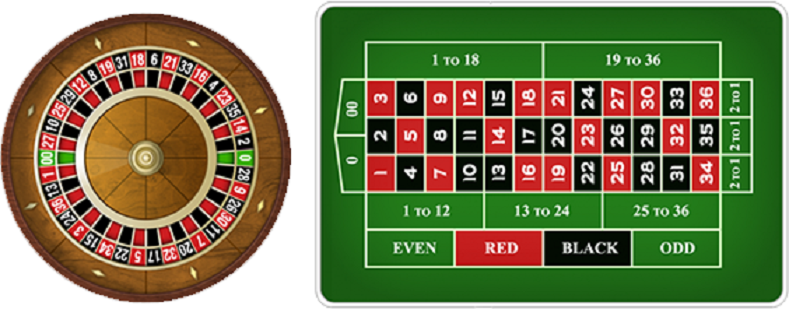Roulette Betting Board
Then, you also bet $10 on the second row of the roulette board, the numbers 2-35. The payout for betting on a column is 2:1, so if you happen to win your bet, say in the first column, then you are going to win $20, making $30 for that column, whilst losing $10 that is bet into the other column. The payout decreases with the more numbers you split. A straight bet (1 number) yields a 35:1 payout, while a 6 line bet offers a 5:1 payout. When you split your wager, the numbers must occur next to each other on the roulette board within a 12-cell block.
I love writing about roulette betting systems because it gives me a chance to show off both my English skills and my math skills. And since no roulette betting system works in the long run, I get to educate and perform a public service — warning people off some of the slick system-sellers who make money from your naivete.
You might be surprised to know, though, that I love to use roulette betting systems when I’m actually gambling.
Yeah, I know you can’t win in the long run with such a system.
But I get bored playing roulette without some kind of system.
And sometimes, in the short run, these systems do work exactly as intended.
Here are my seven favorite roulette systems for you to try:
1 – The Martingale System
The most famous of all betting systems is the Martingale System, and it’s also one of the easiest systems to use. If you can double a number, you can use the Martingale System.
To use the system, you just place an outside bet at the roulette table – one of the bets that pays off at even money. This could be red or black, odd or even, or high or low.
If you win that bet, great!
If you lose, though, you bet again – doubling the size of your previous bet.
You continue with this progression even when you lose multiple times in a row, doubling your bet every time you lose.
If you start with a $5 bet, you’ll bet $10 after losing once, $20 after losing twice, and $40 after losing three times in a row.
Eventually, when you do have a win, you’ll win back the amount of all your previous losses and show a $5 profit.
The Martingale System sounds foolproof at first glance, and it would be foolproof except for two things.
- The first is that you don’t have an unlimited bankroll.
- The second is that the casino has a maximum betting limit.

And when you’re doubling the size of your bets, the bets can get so big so fast that you either can’t cover them because you’re out of money or because the casino won’t let you bet that much on the next spin.
Let’s say you’re playing in a game with a $5 minimum bet and a $500 maximum bet, which isn’t an unusual set of limits.
How many losses in a row do you need before you bang against the maximum bet?
- $5
- $10
- $20
- $40
- $80
- $160
- $320
Lose seven times in a row, and you can’t make the next bet in the progression.
Plus, you’ve lost $495 up until this point.

Of course, in the short run, the Martingale System works a lot of the time, but you don’t usually show much profit.
In the long run, you’ll eventually hit a big enough losing streak to wipe you out.
2 – The Paroli System
The Paroli System is the opposite of the Martingale System. In fact, you’ll sometimes see it called the “Reverse Martingale.”
Instead of doubling the size of your bets after you lose, with the Paroli System, you double them after a win.
Roulette Betting Board
Once you’ve won a specific number of bets in a row (usually three), you return to your initial bet size.
The idea is that you’ll be taking advantage of the occasional winning streaks that are inevitable in a game of random chance like roulette.
You bet $5 on red, so you bet $10 on red on the next spin. You win again, and now you bet $20 on red.
If you win, you’ve won a total of $35 over three spins of the wheel.
And you start over again betting $5.
Of course, in the long run, the Paroli System works no better than the Martingale System, and for the same reason:
Changing the sizes of your bets does nothing to change the odds of winning or losing.
Also, you have no way of predicting when a color gets “hot.”
That’s only visible in retrospect.
3 – The Labouchere Betting System
The Labouochere betting system isn’t one of my favorites because it’s more complicated than I’d prefer.
But it’s not that complicated that you can’t master it.
Here’s how it works:
You start with a list of bets of varying sizes in order from smallest to largest.
For example, you might write 10, 20, 30, and 40 down on a notecard in a row.
You start by placing the lowest bet on the card. If you win that bet, you cross out the first and last numbers on the card.
If you lose that bet, though, you add the size of that bet to the last number in the series. 10 + 40 is 50, so your list would become 10, 20, 30, 40, 50.
You play until you run out of money or until all the bets are crossed off.
You could also eventually run into the same problem you have with the Martingale. You might hit a bet size that’s higher than the table limit or that your bankroll won’t accommodate.
4 – The Grand Martingale System
If you’re not afraid of risk, the Grand Martingale System might be just the ticket for you. It works just like the Martingale System but with one big difference.
Instead of doubling the size of your bet after each loss, you triple the size of your bet after each loss.
The advantage of the Grand Martingale System is that you’ll see bigger winning sessions when you do win.

The disadvantage is that the bet sizes will get much larger much faster, which means you’ll hit your bankroll or maximum bet limits sooner.
Here’s a Grand Martingale progression starting with $5:
- $5
- $15
- $45
- $135
- $405
Notice after just five losses, you must place a bet higher than the table limits of $500 to continue with the progression?
It’s a fun way to play, but it’s still a loser in the long run.
5 – The Hollandish System
The Hollandish System is a gentler roulette system because you don’t raise or lower your bets as often as in other systems. Instead of raising your bet after your first one, you make three bets at a certain amount before raising the size.
The Hollandish System also takes it a little easier on you by not requiring you to raise your bets by as much. You use a specific progression, as follows:
- 1
- 3
- 5
- 7
- 9
So if you start by betting $5, when you get to the next level, you’ll bet $15. And then $25, and so on.
You only move up in levels if you’ve shown a net loss from the three previous bets.

For example, you start with a $5 bet. You win twice, but you lose once. You’re showing a net profit, so you stay at that level for another three-bet streak.
Your buddy, though, lost twice and won once. After three bets, he moves up to betting $15 per bet for the next three bets.
One of the big advantages to this system is that you don’t have to increase the size of your bets as much during an extended losing streak.
Here’s what a progression would look like with six losses in a row using the Martingale System:
- $5
- $10
- $20
- $40
- $80
- $160
But with the Hollandish System, your bets would look like this:
- $5
- $5
- $5
- $15
- $15
- $15
You’ve lost significantly less money on this losing streak using the Hollandish System.
Roulette Betting Board Game
6 – The Hot Number System
This isn’t even a betting system, really. It’s just an attempt to win some money by betting on the “hot” roulette numbers.
To put this system into action, just look at the board at the roulette table showing the numbers that have hit over the last 10 or 20 spins.
Find the number that’s been hit the most often.

Bet on it.
Keep betting on it until another number gets “hotter.” (That just means it’s won more times over the last 10 or 20 spins than your original hot number.
The idea is that you’ll catch a table that isn’t perfectly calibrated and win money based on the higher probability of catching that hot number.
7 – Orson’s Go Big or Go Home System
This one is a system of my own devising. I like the idea of stop-loss limits and win goals, even though I understand that they don’t improve my probability of winning.
With my go big or go home system, I want to win a 35 to 1 payout or go broke, whichever comes first.
I start with about 40 bets of $5, or $200. That’s my loss limit. (I’m not willing to lose more than $200 playing roulette in a single session, almost ever.)
I then choose a number, and I keep betting on that number until it hits, or I run out of money.
Depending on when it hits, I make a big profit or a small profit.
And here’s what I do if I really want to hit it big:
- I let my profits ride so that I can win two jackpots.
- So I bet $5 on 16 and win 35 to 1.
- Now I bet $180 on that number. That’s my winnings plus my original $5 bet.
- If I win this one, it’s time to call it quits, because I’ve hit the jackpot — a cool $6300.
It’s like playing a slot machine with a $6300 jackpot, but my odds of winning are better than they would be on a slot machine game.
Roulette Board Odds
What are the odds of winning?
The odds of winning that bet once are 1/38, or 37 to 1.
1/38 X 1/38 = 1/1444, or 1443 to 1.
I’m still trying to win using this system.
Conclusion
That’s basically just a list of my favorite seven roulette betting systems to use. I want to warn you again that none of these work in the long run.
Betting systems are not advantage systems.
Do you have a favorite roulette system that I didn’t cover here?
Leave a comment and let me know.
Please enable JavaScript to view the comments powered by Disqus.